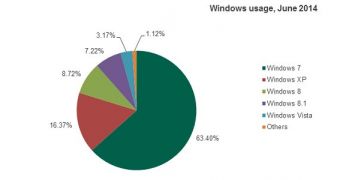Kaspersky is one of the security companies whose products still work on Windows XP despite the end of support reached in April this year. Since then, Microsoft no longer releases updates and security patches for XP users, so it’s easy to see why some decided to upgrade.
But according to Kaspersky, no less than 16 percent of the computers worldwide are still running Windows XP regardless of the security risks that are more or less obvious without official patches.
A research conducted by the security company revealed that Vietnam is the country that tops the “I’m still on Windows XP” list, with a share of 38.79 percent currently owned by the 13-year-old operating system. China is second with 27.35 percent, followed by India with 26.88 percent, and Algeria with 24.25 percent.
Italy and Spain are the two European countries where Windows XP is still a very popular choice, as 20.31 percent and 19.26 percent, respectively, of the desktop computers there are still powered by this old operating system.
“Although technical support for Windows XP users was only discontinued in April 2014, the sales of this operating system finished back in 2010. This, however, did not have much effect on its popularity: according to Kaspersky Lab data in June 2011, a year after the end of sales, 48.86% of users were still using Windows XP,” Kaspersky explained in the research.
“After another year, in June 2012, there were 35.64%, and in June 2013, 25.42% of Windows XP users. Stated differently, the popularity of Windows XP decreased roughly by 10 percentage points each year.”
And still, Kaspersky says, even though Microsoft introduced the new Windows 8.1 in October 2013 and promoted the end of support of Windows XP so aggressively, not many actually agreed to move to a newer operating system.
As a result, many computers are still powered by XP right now, but statistics are clearly showing a steady decline that would in the end lead to the end of an operating system which survived more than it should.
“Interestingly, that decline was not greatly affected by external events which could potentially have accelerated it, such as the release of Windows 8.1 in October 2013 or the discontinuation of the extended Windows XP support: in November 2013, there were 21.42% XP users; by June 2014 the number fell to 16.37%, which makes a 5.05 percentage points' decline, or roughly a half of the total annual decline in XP’s popularity,” the company added.
Word is that Microsoft is also getting ready to give another shot at killing Windows XP once and for all with the release of Windows 9, which could be offered free of charge to those who are running a previous version of Windows. Of course, it’s hard to believe that and old-spec computer could run Windows 9 flawlessly, but at least the licensing costs for a new Windows edition are no longer an issue.

 14 DAY TRIAL //
14 DAY TRIAL //